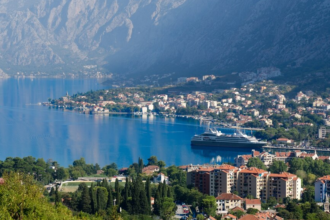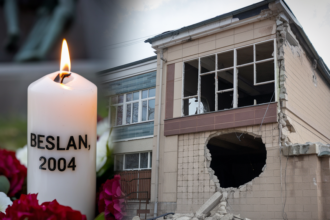As part of any possible ceasefire agreement for Ukraine, Russia is demanding unwavering assurances that Ukraine will maintain its neutrality and refuse to join NATO. According to Russian Deputy Foreign Minister Alexander Grushko, these guarantees are a basic demand in the negotiations.
In an interview with Russian media source Izvestia, Grushko stated, “We will demand that ironclad security guarantees become part of this agreement. “Part of these guarantees should be Ukraine’s neutral status and NATO countries’ refusal to accept it into the alliance.”
Moscow has long seen Ukraine’s NATO ambitions as a direct danger to its regional dominance and security. According to Russian authorities, any future peace agreement must contain a legally binding clause prohibiting Ukraine from joining military alliances with the West. According to the Kremlin, regional stability depends on Ukraine remaining neutral.
What is the US Doing to Broker Peace?
As talks to resolve the three-year conflict in Ukraine continue, US President Donald Trump has said he will meet with Russian President Vladimir Putin on Tuesday. During his Sunday night speech on Air Force One, Trump highlighted the gains of the previous weekend.
“Over the weekend, a lot of work was completed. Trump declared, “We want to see if we can end that war.”
He added that infrastructure issues and territorial considerations would be discussed. “We’ll be discussing land.” When questioned about possible compromises regarding the ceasefire in Ukraine, he stated, “We will be talking about power plants.”
Finding a diplomatic solution has been a top priority for the US and its partners. Since the conflict is still a significant geopolitical issue affecting global stability, many think Washington is eager to end it. Trump’s strategy is more focused on diplomatic talks and possible compromises than the Biden administration’s, which had previously been heavily involved in providing Ukraine with military support.
What is Being Proposed in the Ceasefire Plan?
The United States and Ukraine have proposed a 30-day ceasefire for Ukraine in the hopes that Russia will agree. Putin has indicated that he favors a short-term truce, but he has also outlined strict requirements that must be fulfilled for peace to be established.
The situation in Russia’s western Kursk area, where Ukraine launched an incursion last August and briefly took some land, is one of the primary topics of discussion. According to Putin, the territory has been completely retaken by Russian forces, and Ukrainian forces there “have been isolated.”
Furthermore, Russia has stated unequivocally that any ceasefire deal must contain particular assurances regarding Ukraine’s demilitarisation in areas under dispute. Moscow wants guarantees that Kyiv won’t try to use force to retake seized areas. On the other hand, Ukraine is adamant that any deal acknowledges its sovereignty over the whole country, including regions that Russia presently governs.
The proposed ceasefire plan’s provisions for international monitoring are another crucial element. Western countries have proposed stationing peacekeeping troops along the frontlines to guarantee compliance from both sides. However, citing national security concerns, Russia is still hesitant to allow foreign soldiers close to its borders.
What Are the Challenges in Reaching a Ceasefire?
Despite continued negotiations, significant differences exist regarding implementing and overseeing a ceasefire in Ukraine along the eastern frontline. Ukrainian President Volodymyr Zelensky has charged Putin with purposefully hindering diplomatic attempts.
“Putin is trying to sabotage diplomatic efforts to secure an immediate ceasefire,” Zelensky stated.
US ambassador Steve Witkoff, who recently met with Putin in Moscow, refrained from commenting on how any possible agreement may solve the problem of Russian-occupied territory in Ukraine. At the moment, about 5% of Ukraine is under Russian control.
The question of financial reparations presents another obstacle to a peace deal. Ukraine has demanded on numerous occasions that Russia make up for the war’s devastation, including damage to its infrastructure and the deaths of civilians. However, Moscow has turned down these requests, claiming that Western military assistance and sanctions against Ukraine have drawn out the war.
Another controversial issue is the sanctions imposed by the West on Russia. According to hints from the Kremlin, removing at least some of the economic constraints imposed by the US and EU should be part of any long-term peace agreement. This continues to be a topic of contention since Western officials think that sanctions are required to prevent Russian aggression in the future.
Can Trump Fulfill His Promise to End the War?
During his campaign, Trump made several promises to halt the war “on day one” of a new government. He has spoken with Putin over the phone for ninety minutes about taking quick action to begin negotiations less than a month into his term.
In the past, Trump has voiced doubts about US engagement in Ukraine. According to some analysts, his government may be prepared to exert pressure on Kyiv to give up territory in return for peace. However, Ukrainian leadership and European partners adamant about preserving national sovereignty may strongly oppose such a move.
People are closely monitoring Trump’s direct engagement plan with Putin. His admirers feel that a discussion breakthrough could result from his connection with the Russian leader. However, detractors caution that Trump’s strategy could result in concessions that disproportionately benefit Russia, which could jeopardize Ukraine’s long-term security.
Another element that can affect the negotiations is China’s role. Beijing has promoted diplomatic solutions and positioned itself as an impartial mediator in the dispute. According to some sources, China might supervise some parts of a ceasefire deal, especially those related to commerce and the economy.
It’s unclear if a peace agreement that pleases both sides can be struck as diplomatic efforts heat up. While some view the ongoing talks as a step in the right direction, others worry that the long-standing tensions between Russia and Ukraine would make a durable settlement challenging. Whether a real breakthrough can be achieved or the battle will drag on will be determined in the upcoming weeks.








